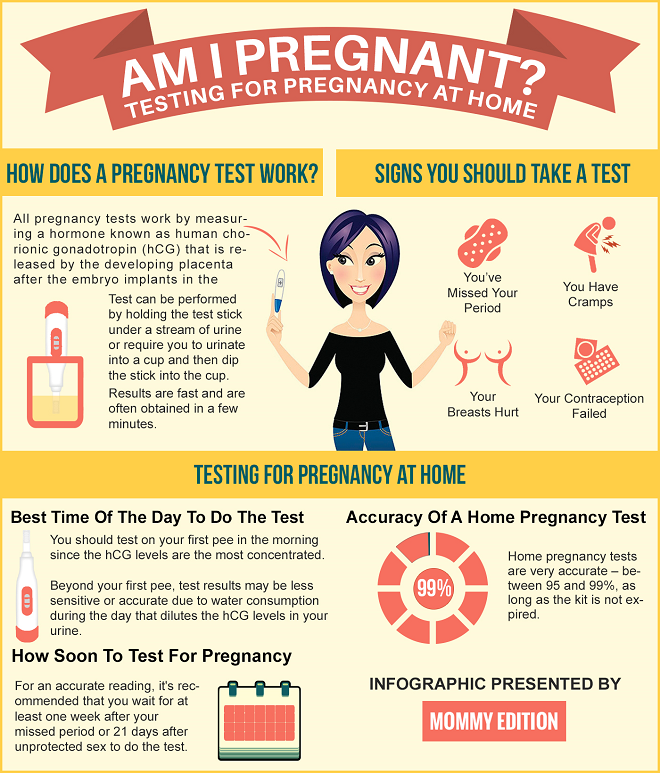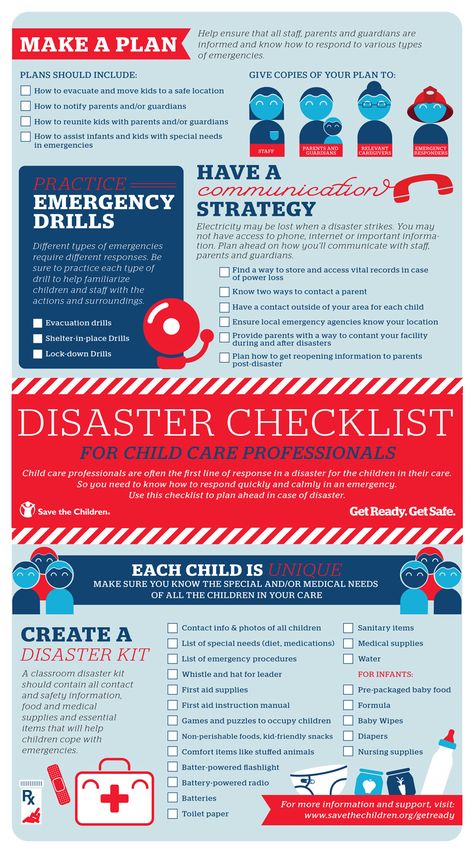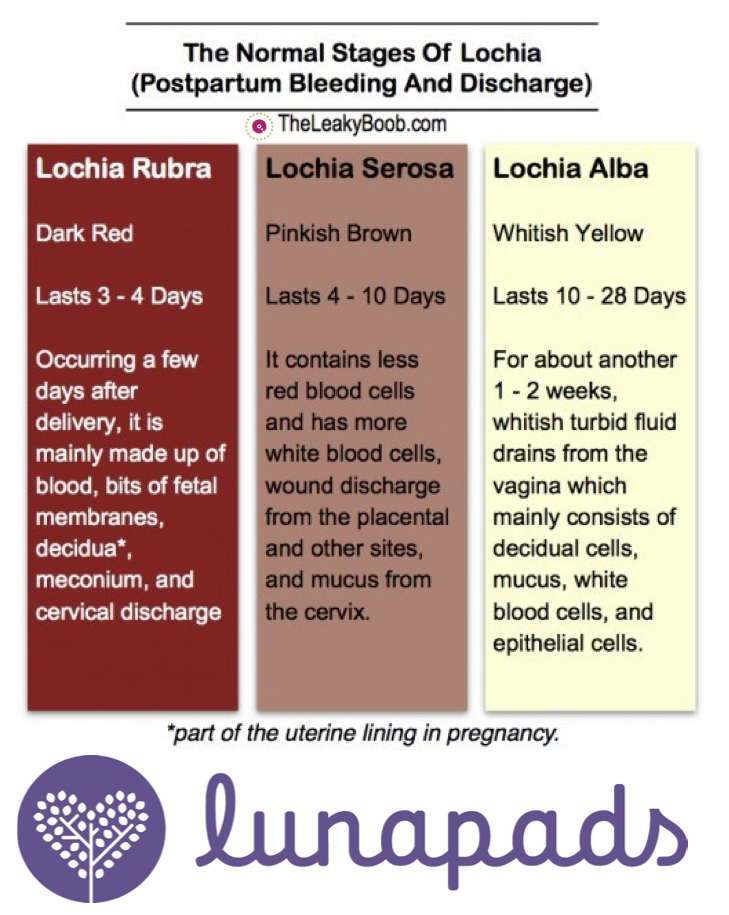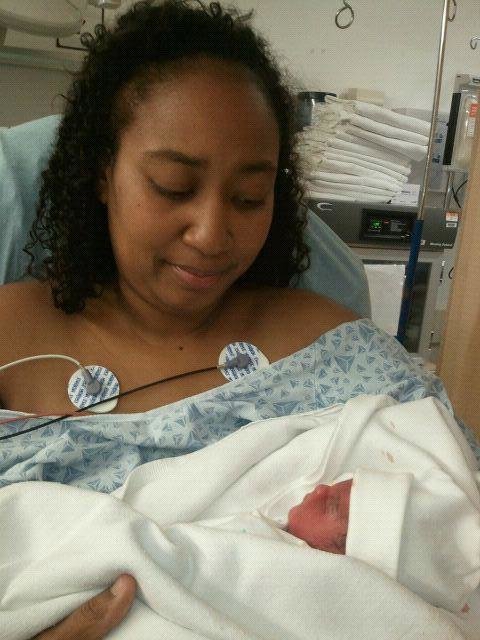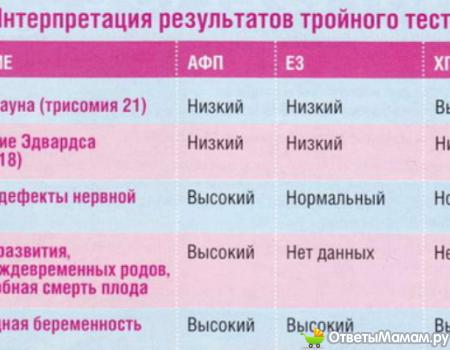Diet first trimester
What to Eat When You're Pregnant: First Trimester
Welcome to the first trimester of pregnancy, complete with morning sickness, exhaustion, breast pain and all the carbs. Before you even see a positive test, your body is already changing. And, even though it's an exciting time for most expecting moms, the physical symptoms can be a real drag. We break down what is actually going on in your body during those first 13 weeks, which nutrients to load up on, and what to do if you feel sick from sunup to sundown.
What's Going On in Your Body
Before you even get pregnant, you can (and should) prepare your body to grow a healthy baby. Folic acid is the most important nutrient to have on your radar even before conception. "Folic acid is an important vitamin that helps prevent neural tube defects. Women need to take at least 400 mcg of folic acid daily starting at least one month prior to conception and throughout the duration of the pregnancy. Most prenatal vitamins include 400-800 mcg of folic acid, but always look at the label when choosing a vitamin or supplement to be certain," said Sara Tingle, N. P.-C, a family nurse practitioner in Athens, Georgia.
Folic acid can be obtained through a variety of foods, such as beans, lentils, fortified cereals and dark leafy greens, but you should still take a prenatal vitamin to make sure you're getting adequate amounts.
Once you see that plus sign, you are already about four weeks pregnant, since pregnancy dating is counted from the first day of your last period. The first trimester includes the first 13 weeks. "Physically, the body is experiencing a surge in pregnancy hormones, specifically estrogen and progesterone, which can cause feelings of nausea and morning sickness," said Crystal Karges, M.S., R.D.N., a San Diego-based private practice dietitian and lactation consultant. Human chorionic gonadotropin (HCG) is also on the rise. This hormone is the one detected on your at-home pregnancy test, and some believe it is responsible for nausea and frequent urination.
Progesterone slows down muscle movement in the body, which can lead to constipation for some women.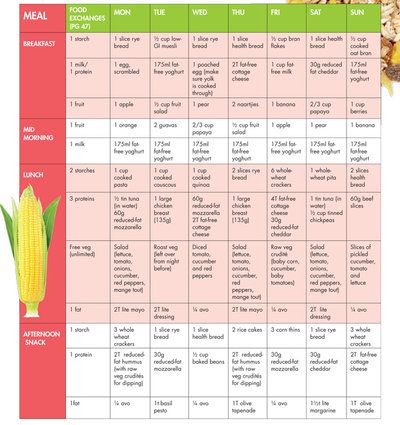 You may also experience light bleeding as the embryo implants in the uterus, but it is nothing to worry about unless bleeding is severe, in which case you should contact your doctor. Also, expect very sore breasts. Your body is already ramping up for milk production.
You may also experience light bleeding as the embryo implants in the uterus, but it is nothing to worry about unless bleeding is severe, in which case you should contact your doctor. Also, expect very sore breasts. Your body is already ramping up for milk production.
There is a lot going on during these first 13 weeks. In fact, by the end of the first trimester, your baby will weigh one ounce and have arms and legs. Fingernails, toenails and reproductive organs will also start to form. It's no wonder you are tired.
Important Nutrients
Peanut Butter & Jelly Smoothie
Folic acid: Found in beans, citrus fruits, green leafy vegetables and your prenatal vitamin.
Calcium: Found in dairy (milk, yogurt and cheese) and dark leafy greens.
Iron: Found in meat, poultry, seafood, beans and greens.
Choline: Found in red meat and eggs.
Vitamin B12: Found in meat, poultry, seafood, as well as fortified breads and cereals.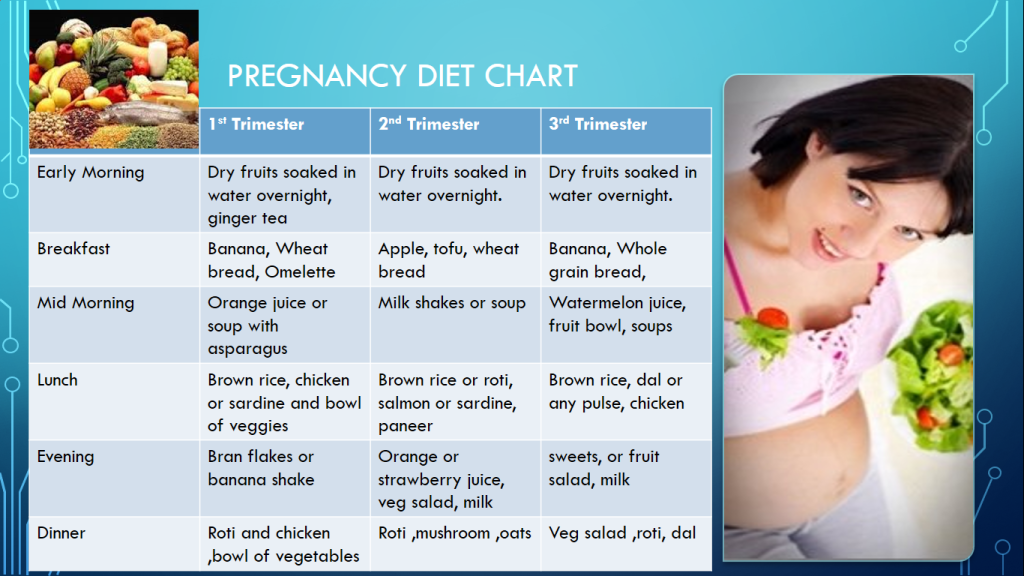
Omega-3 fatty acids: Found in fatty fish, chia seeds, flax seeds and fortifed foods.
Pregnant or not, food is your fuel, and that fuel is extremely important as you grow a human being inside of you. The baby eats what you eat, and the baby needs vitamins and minerals to support growth of its tiny brain and bones. Specifically, "Nutrients needed during the first trimester to support a healthy pregnancy include calcium (about 1,200 mg/day), folate (600-800 mcg/day), and iron (27 mg/day)," said Karges. "These increased nutrient needs can typically be met by eating a diet that offers a wide variety of healthy foods and supplementing with a prenatal vitamin."
"Because your baby's nervous system is starting to develop, it is also important to get adequate amounts of choline, B12 and omega-3 fatty acids," said Ingrid Anderson, R.D.N., founder of Results Dietetics. "Sources of these nutrients include eggs, salmon and walnuts."
Although your body is hard at work, you do not need any extra calories until the second trimester. However, it is normal to gain 3 to 5 pounds in the first trimester due to increased blood and fluid volume.
However, it is normal to gain 3 to 5 pounds in the first trimester due to increased blood and fluid volume.
Don't Miss: 27 Pregnancy Power Foods to Eat More Of
When You Can't Stomach Vegetables
Easy Smoothie Bowl
Morning sickness is common for many women during the first trimester. News flash: it doesn't just happen in the morning. You can feel nauseous at any time of day, and anything can trigger it. Food aversions are also common and can be related to nausea. "Helpful tips for managing nausea include avoiding an empty stomach, eating a smaller amount of food more frequently, eating lower-fat foods, and drinking plenty of fluids," said Lindsey Janeiro, R.D.N., C.L.C., dietitian and owner of Nutrition to Fit. "Eating foods that are easier for the body to digest can also help with nausea, such as rice, applesauce, fresh fruit, multigrain crackers/bread, clear-based broths and soups, potatoes, yogurt and dry, bland multigrain cereals," said Karges.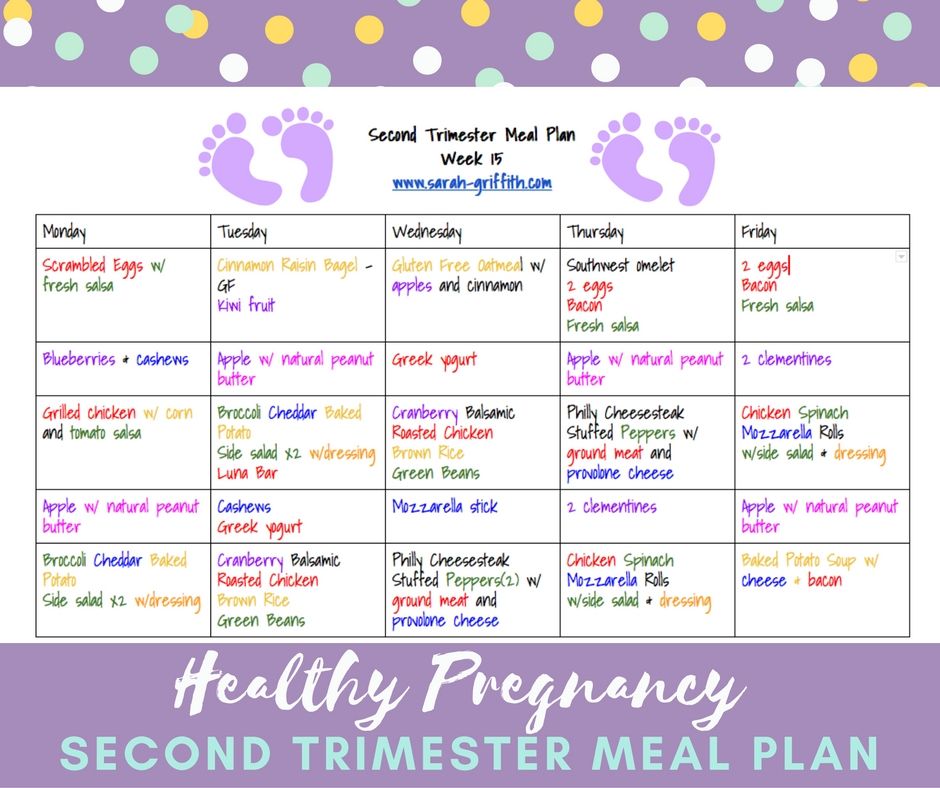 Also: "Vitamin B6 has been shown to ease nausea," according to Anderson. But check with your doctor before adding any supplements.
Also: "Vitamin B6 has been shown to ease nausea," according to Anderson. But check with your doctor before adding any supplements.
Many women can't stand the thought of a fruit or vegetable and just want comfort food during the first trimester. If this sounds like you, "try incorporating some health into the foods you are craving," said Anderson. "For example: if you are craving french fries, try cutting sweet potatoes into sticks, drizzling oil and sprinkling salt on them and baking them in the oven until they are crispy. Or if ice cream is more your thing, try blending a frozen banana with a small amount of milk to create an ice-cream-like texture and taste." Your diet doesn't have to be perfect during pregnancy. When you are feeling good, seize the opportunity to eat your fruits and vegetables. When you aren't feeling so great, reach for the comfort food.
Overall, "it's important to eat foods that you can tolerate and that feel good in your body," Karges said. Do the best you can. "Sometimes that means having a salad with that pizza you're craving, and sometimes that means simply eating whatever you can keep down," said Janeiro. If nausea or food aversions persist for a long time and you feel your baby is not getting adequate nutrients, be sure to talk to your doctor.
"Sometimes that means having a salad with that pizza you're craving, and sometimes that means simply eating whatever you can keep down," said Janeiro. If nausea or food aversions persist for a long time and you feel your baby is not getting adequate nutrients, be sure to talk to your doctor.
Foods That Help with Nausea:
• Cold foods: yogurt, smoothies, frozen fruit
• Ginger
• Peppermint
• Lemon
• Bland foods
Exercise During the First Trimester
Woman hiking
Rumor has it that you should cut back on exercise during pregnancy, but this is not true. You can continue anything you were doing before, as long as you listen to your body and stop if you start to feel light-headed, dizzy or shaky. In fact, exercise is beneficial for mama and baby. The American College of Obstetricians and Gynecologists recommends that pregnant women exercise 20 to 30 minutes every day with a mix of cardio and strength. Exercising during pregnancy can prevent excessive weight gain, reduce risk of gestational diabetes, decrease likelihood of a C-section and improve postpartum recovery time.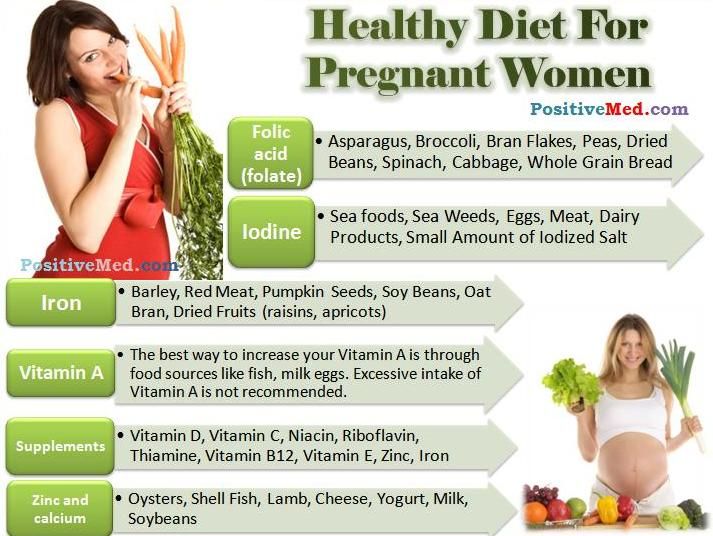 Take advantage of the times you are feeling good and get moving, but don't stress if you can't work out every day. Rest is equally important.
Take advantage of the times you are feeling good and get moving, but don't stress if you can't work out every day. Rest is equally important.
Exercises To Try:
• Walking
• Swimming
• Strength training
• Stationary biking
• Yoga
• Pilates
Watch: How to Make a Healthy Smoothie Bowl
Nutrition During Pregnancy | Johns Hopkins Medicine
The Academy of Nutrition and Dietetics recommends the following key components of a healthy lifestyle during pregnancy:
Dietary and Caloric Recommendations
To maintain a healthy pregnancy, approximately 300 extra calories are needed each day. These calories should come from a balanced diet of protein, fruits, vegetables and whole grains. Sweets and fats should be kept to a minimum. A healthy, well-balanced diet can also help to reduce some pregnancy symptoms, such as nausea and constipation.
Fluid Intake During Pregnancy
Fluid intake is also an important part of pregnancy nutrition.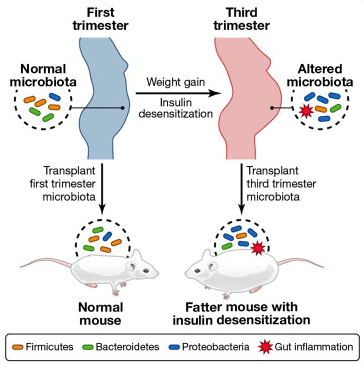 Follow these recommendations for fluid intake during pregnancy:
Follow these recommendations for fluid intake during pregnancy:
-
You can take in enough fluids by drinking several glasses of water each day, in addition to the fluids in juices and soups. Talk to your health care provider or midwife about restricting your intake of caffeine and artificial sweeteners.
-
Avoid all forms of alcohol.
Ideal Foods to Eat During Pregnancy
The following foods are beneficial to your health and fetal development during pregnancy:
-
Vegetables: carrots, sweet potatoes, pumpkin, spinach, cooked greens, tomatoes and red sweet peppers (for vitamin A and potassium)
-
Fruits: cantaloupe, honeydew, mangoes, prunes, bananas, apricots, oranges, and red or pink grapefruit (for potassium)
-
Dairy: fat-free or low-fat yogurt, skim or 1% milk, soymilk (for calcium, potassium, vitamins A and D)
-
Grains: ready-to-eat cereals/cooked cereals (for iron and folic acid)
-
Proteins: beans and peas; nuts and seeds; lean beef, lamb and pork; salmon, trout, herring, sardines and pollock
Foods to Avoid During Pregnancy
Avoid eating the following foods during pregnancy:
-
Unpasteurized milk and foods made with unpasteurized milk (soft cheeses, including feta, queso blanco and fresco, Camembert, brie or blue-veined cheeses—unless labeled “made with pasteurized milk")
-
Hot dogs and luncheon meats (unless they are heated until steaming hot before serving)
-
Raw and undercooked seafood, eggs and meat.
 Do not eat sushi made with raw fish (cooked sushi is safe).
Do not eat sushi made with raw fish (cooked sushi is safe). -
Refrigerated pâté and meat spreads
-
Refrigerated smoked seafood
Guidelines for Safe Food Handling
Follow these general food safety guidelines when handling and cooking food:
-
Wash. Rinse all raw produce thoroughly under running tap water before eating, cutting or cooking.
-
Clean. Wash your hands, knives, countertops and cutting boards after handling and preparing uncooked foods.
-
Cook. Cook beef, pork or poultry to a safe internal temperature verified by a food thermometer.
-
Chill. Promptly refrigerate all perishable food.
Prenatal Vitamin and Mineral Supplements
Most health care providers or midwives will prescribe a prenatal supplement before conception or shortly afterward to make sure that all of your nutritional needs are met. However, a prenatal supplement does not replace a healthy diet.
However, a prenatal supplement does not replace a healthy diet.
The Importance of Folic Acid
The U.S. Public Health Service recommends that all women of childbearing age consume 400 micrograms (0.4 mg) of folic acid each day. Folic acid is a nutrient found in:
-
Some green leafy vegetables
-
Most berries, nuts, beans, citrus fruits and fortified breakfast cereals
-
Some vitamin supplements.
Folic acid can help reduce the risk of neural tube defects, which are birth defects of the brain and spinal cord. Neural tube defects can lead to varying degrees of paralysis, incontinence and sometimes intellectual disability.
Folic acid is the most helpful during the first 28 days after conception, when most neural tube defects occur. Unfortunately, you may not realize that you are pregnant before 28 days. Therefore, your intake of folic acid should begin before conception and continue throughout your pregnancy.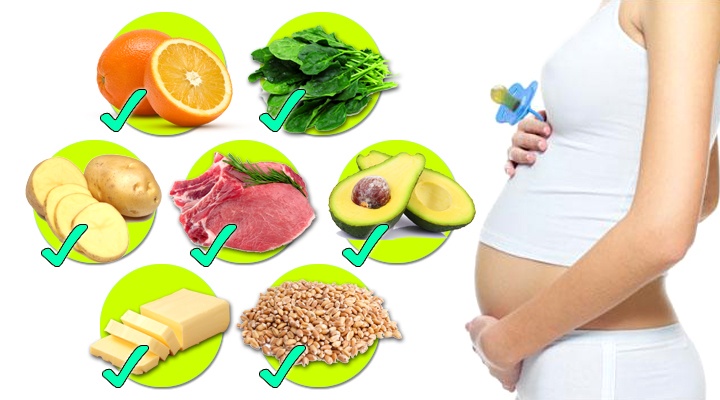 Your health care provider or midwife will recommend the appropriate amount of folic acid to meet your individual needs.
Your health care provider or midwife will recommend the appropriate amount of folic acid to meet your individual needs.
For example, women who take anti-epileptic drugs may need to take higher doses of folic acid to prevent neural tube defects. They should consult with their health care provider when considering trying to conceive.
Nutrition in the 1st trimester of pregnancy
In the first trimester of pregnancy, the active formation of the fetus takes place, so it needs a lot of vitamins and nutrients. This must be taken into account when compiling a menu for a woman during this period. We will talk about what else to take into account and what should be the menu in the first trimester in this article.
Nutrition for a pregnant woman: what to remember
You can often hear something like “you need to eat for two” addressed to a pregnant woman. However, this statement is not entirely true, because for development and formation, the child needs not so much calories as vitamins and microelements.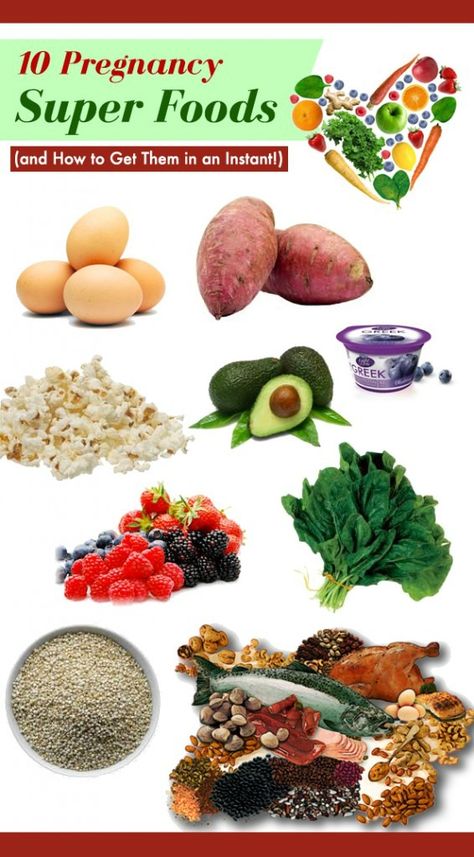 It is because of their lack at the very beginning of pregnancy that pathologies can occur in the development of the fetus. As for calories, they should be distributed approximately as follows: 100-120 g of protein, up to 350 g of carbohydrates and only 75 g of fat. The total daily calorie intake should be within 2700 Kcal.
It is because of their lack at the very beginning of pregnancy that pathologies can occur in the development of the fetus. As for calories, they should be distributed approximately as follows: 100-120 g of protein, up to 350 g of carbohydrates and only 75 g of fat. The total daily calorie intake should be within 2700 Kcal.
The second point is toxicosis, which accompanies the first stage of pregnancy in many women. Fortunately, by choosing the right foods and preparing them, you can keep discomfort to a minimum. To avoid unnecessary stress on the gastrointestinal tract and alleviate the symptoms of toxicosis, it is better to limit the use of fried, spicy and salt, not to mention coffee and alcohol. It is permissible for a pregnant woman to consume no more than 5-6 g of salt per day per day.
The third point is the power frequency. In the first trimester, it is better to eat in small portions, but often - 5-6 times a day. At the same time, one should not neglect a full breakfast, because its absence can provoke fainting and weakness.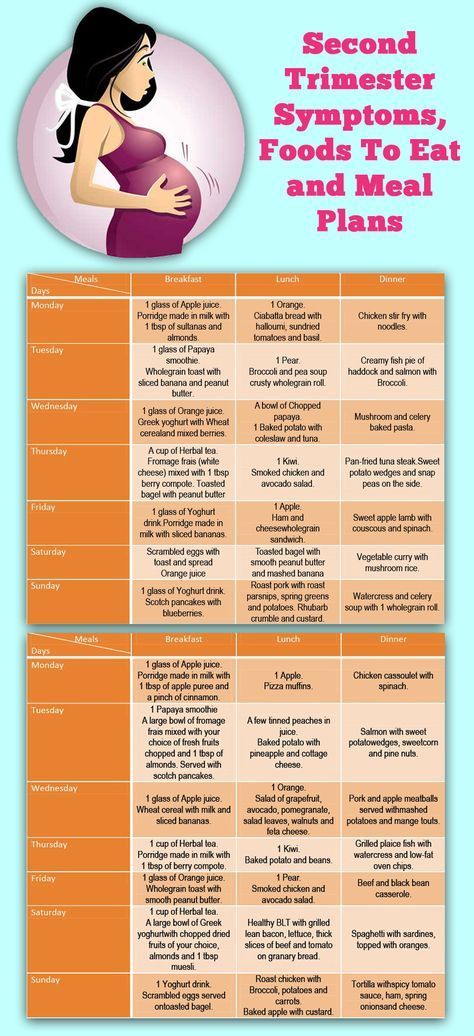 The last meal should be no later than 2-3 hours before bedtime.
The last meal should be no later than 2-3 hours before bedtime.
What should be in the diet?
In short, products that will provide the developing fetus with essential vitamins and microelements. So, literally from the moment of fertilization, folic acid is necessary for the proper development of the fetus. Therefore, you need to eat foods with a high content of iron, such as liver, eggs, bananas, Brussels sprouts, spinach, etc.
To avoid anemia in the mother and fetus, foods high in iron are needed. These are red meat, liver, nuts and pastries made from coarse flour.
Foods containing magnesium can help to avoid complications and problems with low weight in a baby. It must be taken daily in an amount of at least 300 mg. Avoid coffee and foods containing artificial sweeteners to avoid magnesium deficiency.
For the proper development of the skeletal system, the fetus needs calcium. During the day, the mother needs to receive about 1200 mg of calcium. They are rich in sea fish, eggs and dairy products. And for calcium to be absorbed, it must be taken along with vitamin D.
They are rich in sea fish, eggs and dairy products. And for calcium to be absorbed, it must be taken along with vitamin D.
Among other things, the expectant mother should eat foods rich in Omega-3 complex.
It is possible to minimize problems and errors in nutrition if you think through everything in advance. It is optimal to make a menu for a week, taking into account the necessary calories and trace elements and buy food in advance (except perishable ones). During the period of toxicosis, it is better to prepare a morning snack in the evening so as not to skip breakfast due to poor health.
And you can get professional advice from a specialist in nutrition during pregnancy in our medical center.
Nutrition for a pregnant woman
So, your plans and decisions to have a baby have come true - you are pregnant! But this news causes you a double feeling: - on the one hand, a feeling of joy, and on the other hand, a feeling of certain fear and even fear of unknown trials for your life and the fate of the unborn baby. What will he be like? - healthy, beautiful, happy?...
What will he be like? - healthy, beautiful, happy?...
And this largely depends on the woman herself, on what lifestyle she will lead during pregnancy and, most importantly, how she will eat.
Nutrition of a woman in different periods of pregnancy
The main thing in the menu of a future mother is variety. She should consume foods from all food groups: meat, fish, vegetables and fruits, dairy products, bread and cereals.
A woman's nutrition during pregnancy can be roughly divided into three periods (trimesters).
If before pregnancy a woman ate normally, felt comfortable, did not experience allergies to any products, then it is not worth changing her diet at an early stage of the first trimester of pregnancy.
During this period, all organs and systems in the child's body are formed, tissues are formed. The body needs complete proteins and vitamins: lean meat (rabbit, chicken, turkey), fish and seafood, dairy products. Be sure to eat rice, fresh or frozen vegetables, seasonal fruits.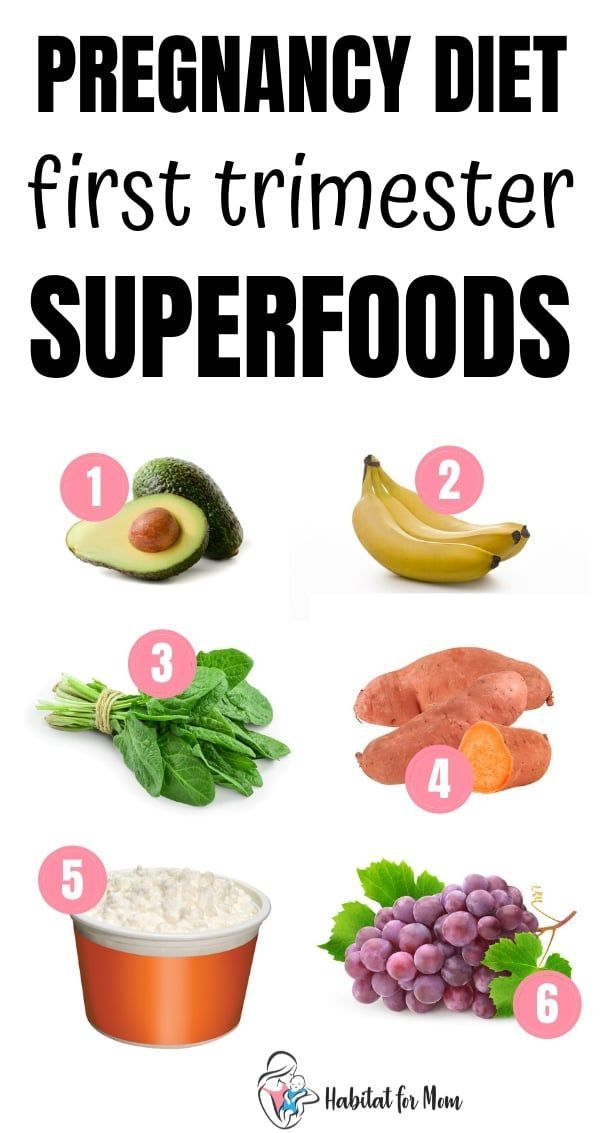 In the first trimester, many expectant mothers are still working. No matter how difficult it is to control your diet in the workplace, you need to do it - find time for a full breakfast and lunch.
In the first trimester, many expectant mothers are still working. No matter how difficult it is to control your diet in the workplace, you need to do it - find time for a full breakfast and lunch.
In the first trimester of pregnancy, there is an active restructuring of the body and adaptation to a new state. During this period, it is recommended to switch to a low-calorie diet, which includes more fruits, juices, decoctions of dried fruits, including rose hips. At the very beginning of pregnancy, especially if toxicosis torments, more frequent, but less plentiful meals are recommended.
Always keep a hematogen, a bag of nuts or dried fruit in your pocket to have a snack on the street. If your condition does not allow you to eat regular food, you should pay attention to baby food. Baby products literally save expectant mothers suffering from severe toxicosis. These are boxed cereals, children's curds, cookies and fruit purees.
In the first trimester, special attention must be paid to the quality of products.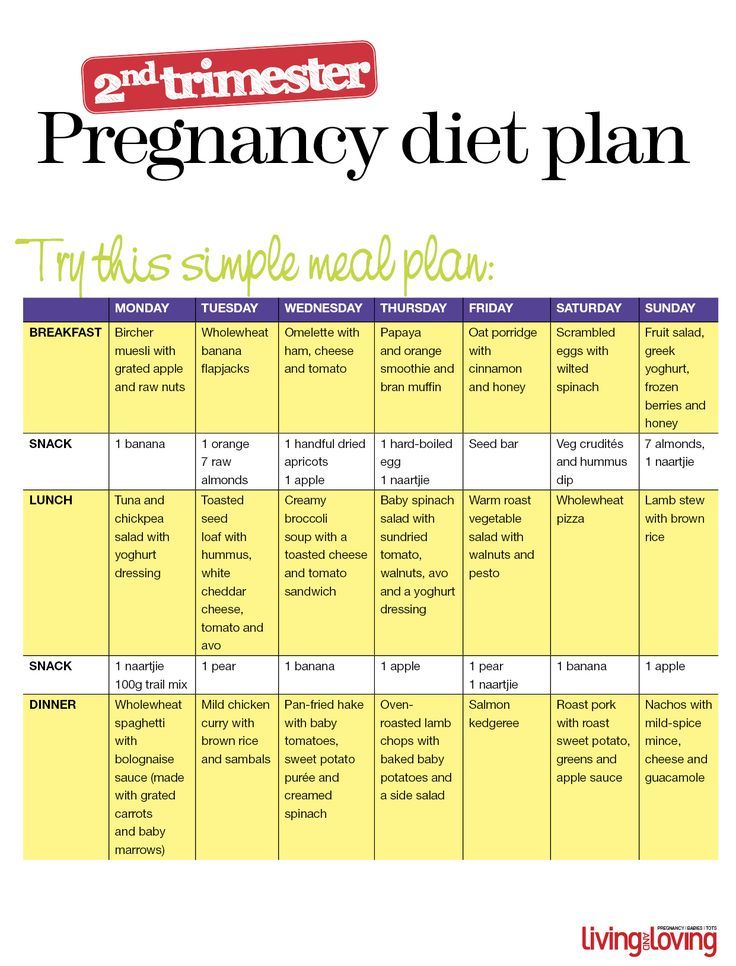 Gradually abandon sauces, semi-finished products and canned food containing harmful chemical additives. Do not forget that the placenta freely accumulates and passes chemistry. The importance of products containing folic acid is great, without it intensive metabolism is impossible, its deficiency can cause developmental abnormalities. Folic acid is found in greens, nuts, white cabbage and broccoli, beets, legumes, and eggs.
Gradually abandon sauces, semi-finished products and canned food containing harmful chemical additives. Do not forget that the placenta freely accumulates and passes chemistry. The importance of products containing folic acid is great, without it intensive metabolism is impossible, its deficiency can cause developmental abnormalities. Folic acid is found in greens, nuts, white cabbage and broccoli, beets, legumes, and eggs.
According to nutritionists, the diet of pregnant women should be 300 kcal / day higher than that of non-pregnant women, but in the first trimester there is no need to increase the energy value of the diet at all; in the second trimester, an additional 340 kcal / day is required; in the third trimester - 452 kcal / day. Pregnant women generally get enough calories, and more than 80% of women achieve and even exceed the required weight gain. These extra calories benefit the fetus. An underweight woman should gain 16–20 kg during her entire pregnancy, an overweight woman about 7 kg, and a normal body weight of 11–12 kg.
In the second trimester there are active jumps in the height and weight of the baby and uterus, so the caloric content of the diet needs to be increased. It is desirable to eat more and better. At this time, the need for trace elements increases: iron, magnesium, zinc, selenium, calcium, potassium. The child creates his own "reserve" of trace elements using the mother's resource, which means that the mother should have enough of them for two.
Very often in pregnant women in the second trimester hemoglobin drops, this is a normal physiological phenomenon, if it is not threatening to health. You can increase hemoglobin by eating red meat, chicken, fish, dried fruits, pomegranates, green vegetables and fresh herbs, buckwheat, citrus fruits (oranges, grapefruits, pomelo, lemons), rosehip and berry infusions.
In the second trimester, a pregnant woman should limit the intake of smoked and fried foods, as well as salt in her diet. In no case should you limit the liquid.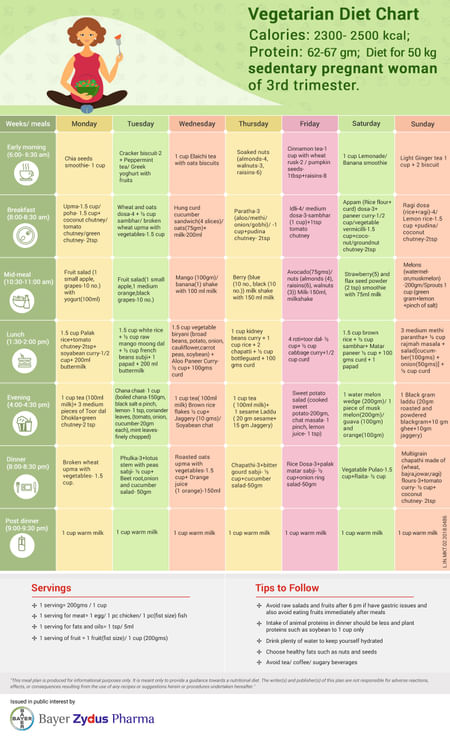 Pure water is the best drink for a pregnant woman, and water should be consumed up to 2-2.5 liters per day. Water is a natural drink for the body, it does not cause complications and has no contraindications. Edema is caused not by water, but by salt, which we not only add in its pure form, but also consume with canned food, mayonnaise, cheese, and sausage. The absence of salt is not harmful, it is naturally found in many products: vegetables, bread, so the diet will not remain completely without it. Excess salt disrupts metabolism.
Pure water is the best drink for a pregnant woman, and water should be consumed up to 2-2.5 liters per day. Water is a natural drink for the body, it does not cause complications and has no contraindications. Edema is caused not by water, but by salt, which we not only add in its pure form, but also consume with canned food, mayonnaise, cheese, and sausage. The absence of salt is not harmful, it is naturally found in many products: vegetables, bread, so the diet will not remain completely without it. Excess salt disrupts metabolism.
During this period, you can increase the calorie content of food. Childbirth must be approached physically strong. It is better to eat meat and fish in the morning, for breakfast and lunch, and for dinner, prepare dairy and vegetable dishes: cheesecakes, stewed vegetables, cottage cheese and vegetable casseroles. It is necessary to minimize the intake of canned food, smoked meats, pickles and marinades, hot spices and fatty foods. Frequent walks in the air, physical activity are recommended.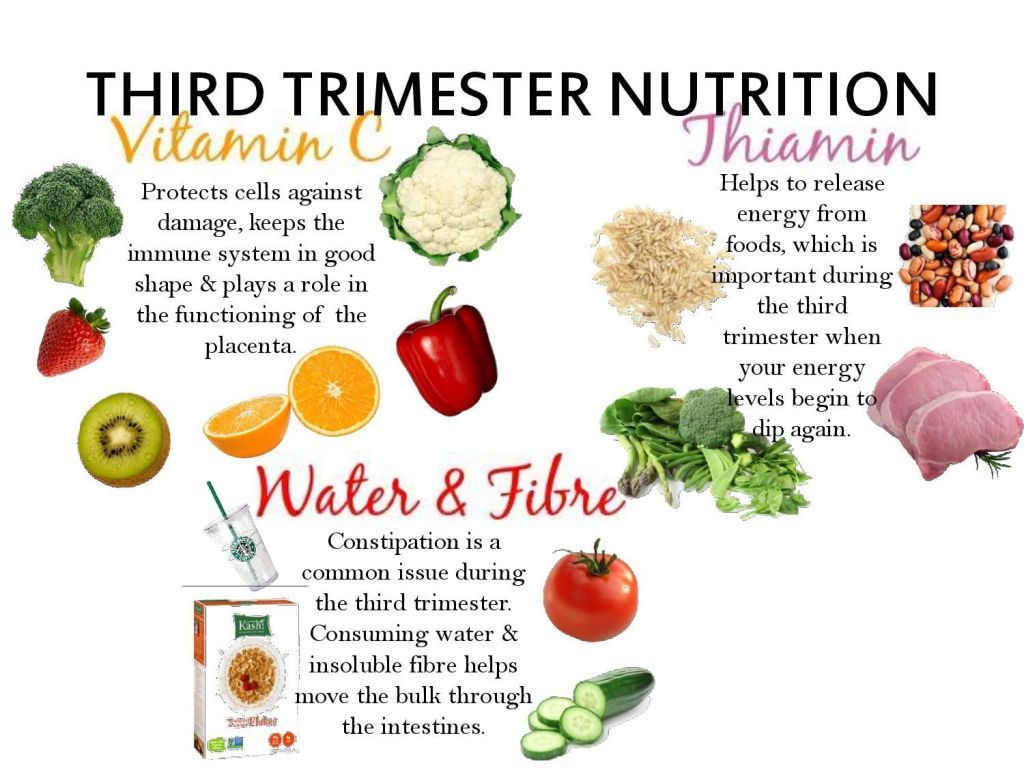
In the third trimester, it is necessary to reduce the calorie content of foods at the expense of confectionery and flour products, eat less fatty meat, as well as cheese and sour cream.
By the end of this period, many experts advise pregnant women to give up meat altogether in order to increase tissue elasticity and prevent ruptures.
During the entire period of pregnancy, special attention should be paid to the combination of products. If you combine foods wisely, you can ensure more efficient absorption of food. If the food is digested poorly, then this can lead to rotting and fermentation of products and the formation of substances harmful to the body of the mother and child. In addition, the fermentation process is accompanied by gas formation, which can lead to flatulence (bloating) and discomfort. This is especially harmful in the last stages of pregnancy.
Try not to take the first, second and third course at the same time; this overflows the stomach and presses on the fetus, the food is poorly digested and poorly absorbed.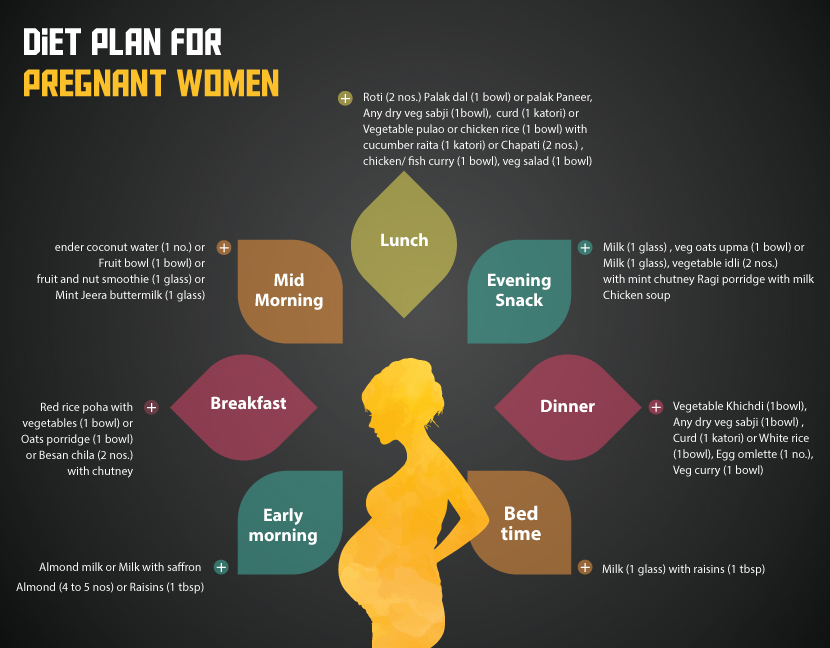 Eat little and often. It is not recommended to eat immediately before starting work, a long walk, before charging and immediately after it; it is advisable to rest for 10 minutes before eating.
Eat little and often. It is not recommended to eat immediately before starting work, a long walk, before charging and immediately after it; it is advisable to rest for 10 minutes before eating.
Eat only when you are hungry, try not to snack on the go. Follow the diet, eat at about the same time.
Proper preparation of food will help to maximize the useful substances contained in the products. Do not overcook food, try not to reheat the same dish several times, it is better to set aside only the portion that will be used. Cook in the most gentle way: baking, steaming, stewing. Avoid frying, boiling in large amounts of water, with this method of processing products, many useful substances are lost. If possible, do not cook for several days at once. Do not use aluminum cookware when cooking. Remember that for a pregnant woman, it is not calories that are important, but the quality of food, its naturalness, primarily a “living cell” (whole cereals, raw vegetables and fruits, fresh meat and dairy products).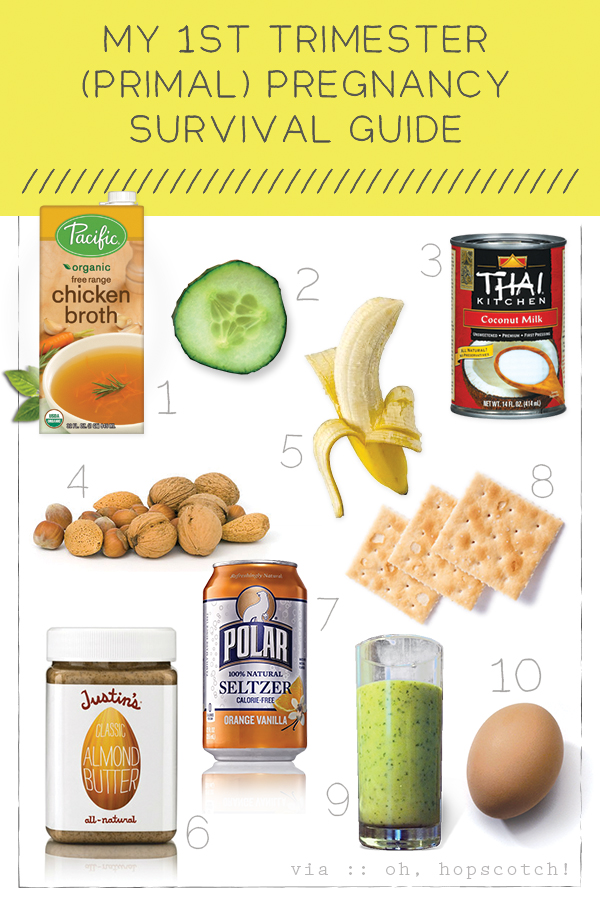
What can harm the pregnant woman and the fetus
Smoking and alcohol – quit smoking from the first days of pregnancy, if you have smoked before, avoid "passive" smoking, and do not consume alcoholic beverages in any doses.
Lack of vitamins and microelements in the body - their absence or deficiency can lead to irreparable consequences. So, for example, iodine deficiency can lead to mental retardation of a child, folic acid deficiency - to severe fetal deformities, calcium deficiency - to a violation of the formation of the child's skeleton, iron deficiency - to anemia and a delay in the physical and neuropsychic development of the child. It is necessary to consult a doctor, perhaps he will recommend switching to iodized salt, as well as supplementing your diet with a vitamin-mineral complex and folic acid.
Excess weight is the risk of having a large child, which means the risk of complications during childbirth and the child's tendency to become obese at an older age.


